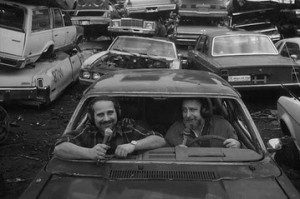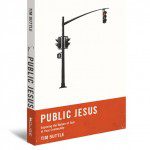 In my twenties and thirties, I spent more time on the road than at home. I was attempting to make a career in music, first on my own, then with the band Satellite Soul. I was a fickle NPR listener in the beginning, but that many hours staring at the horizon (pre-Sirius Satellite Radio and in car DVD players), had me and my mates searching the dial for something worth listening to. More times than not, NPR was the only thing worth hearing. The Magliozzi brothers and their show Car Talk, became familiar and friendly voices in an often lonely time.
In my twenties and thirties, I spent more time on the road than at home. I was attempting to make a career in music, first on my own, then with the band Satellite Soul. I was a fickle NPR listener in the beginning, but that many hours staring at the horizon (pre-Sirius Satellite Radio and in car DVD players), had me and my mates searching the dial for something worth listening to. More times than not, NPR was the only thing worth hearing. The Magliozzi brothers and their show Car Talk, became familiar and friendly voices in an often lonely time.
Tom and Ray Magliozzi used a conversation about cars as a medium to talk about life, philosophy, relationships, and the human experience. It was always funny, but the genius of the show was their chemistry, and their big hearts.
After my kids were born & the movie Cars came out, the two voices became part of their lives as well. They played the star struck pitch me for Rust-eze, sponsors of Lightening McQueen’s car. We still catch a Car Talk segment every now and then when we’re in the car together. These men were hilarious and fun, generous and insightful… a matched pair if ever there was one in broadcasting.
Tom Magliozzi died of complications from Alzheimer’s Disease earlier this week. He will be deeply missed.
Here’s an excerpt from a great tribute article from Paste, written by Sarah Marshall. It’s a good article, and would be worth a full read:
There was never anything hip about Tom and Ray Magliozzi, who made their debut on NPR when it was still deeply uncool, and who were slowly grandfathered in even as the neighborhood began to change drastically around them. Car Talk wasn’t cool: only warm, generous, loud, and impossible to imagine not having around, like the lone Boston-Italian family on a block filling up with serious young professionals who keep compost heaps in their backyards. They felt like family, even if you’d never met them, and they ended each show making listeners and callers alike feel somehow better about the world, even if they still didn’t know what was wrong with their carburetors. And, as part of an institution that prided itself on producing the kind of programming that made people challenge their ideas and change their minds, Tom and Ray Magliozzi lived up to this mission weekly, and without ever seeming to try very hard. In one memorable show, a long-frustrated woman called in determined to beat her old VW to smithereens rather than selling it. Five minutes later, she agreed to give away for free to a needy stranger instead. “We wish you the very best,” Tom said, seeming, as he always did, to mean it. As it turns out, you can only listen to so much laughter—and a little gentle chiding—before you begin laughing yourself.
Car Talk was also something listeners could all too easily take for granted. In its 25-year broadcast history (35 if you counted back the show’s initial run on Boston’s WBUR), Car Talk was always the same. There was always the same mix of listener problems, ranging from the simple to the philosophical, the jokes and puzzlers, the ritual of the sign-off (“Don’t drive like my brother!” “Don’t drive like my brother!”), and, of course, the laughter. When you listen to the episodes of classic Car Talk now on the show’s website in podcast form, the years quickly become indistinguishable from each other. Or, as Caspian Kang wrote, “the only way you can tell a 2010 recording from a 1989 recording is the years of the caller’s cars.” Like the Ramones, the Magliozzi brothers were consistent enough for the public to take their continued existence as a given and did something that seemed simple until you realized just how hard it was to replicate.
Today, people who grew up with Car Talk may live in a world very different from seventh grade gym. Being an NPR listener is not just a badge of cultural awareness, but a go-to conversation topic at parties. “Did you hear that episode of RadioLab where…” is the new “Don’t I know you from somewhere?” And seeing someone listening to a podcast of This American Life is a bit like spotting a colored handkerchief in someone’s back pocket once was for the leather bar crowd, “Don’t you just love Ira Glass?” being the nebbish mating call of the podcast age.













